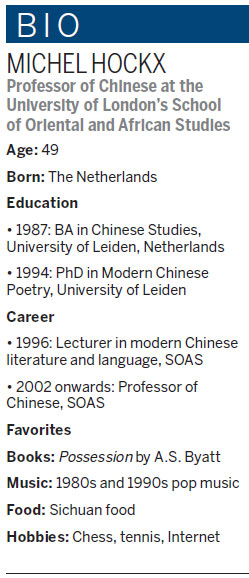Nothing succeeds like the written word

| Michel Hockx, professor of Chinese at the University of London's School of Oriental and African Studies, says great literary works are a valuable tool for China in its efforts to boost soft power internationally. Monica Wyithe / For China Daily |
Works of literature are valuable tools in China's outreach to the world, expert says
Chinese literature has played a key role in communicating Chinese values and cultural traditions to the Western world and needs to be promoted more aggressively, a British academic says.
Michel Hockx, professor of Chinese at the University of London's School of Oriental and African Studies, believes China's rapid growth, economically and politically, will also contribute to increased interest in its literature.
Great literary works are a valuable tool for China in its efforts to boost soft power internationally, says Hockx, who is also president of the British Association for Chinese Studies.
"Introducing Western people to Chinese classics and cultural traditions, including Confucianism, Daoism and Buddhism, is typically what a soft power initiative would do," Hockx says.
Initiatives like the SOAS China Institute, which is about to open, has encouraged scholars from various disciplines to research and teach about China, and will play a key role in China's soft power plans, he says.
As someone who has championed the SCI initiative, Hockx says appreciation for Chinese literature and culture has been growing steadily.

Coinciding with the growing interest in China has been the growth of Confucius institutes in Europe. The institutes, essentially Chinese language learning centers, have contributed in a big way to the increasing number of students taking Chinese language learning courses at the university level.
More and more Chinese literary works are now being translated into Western languages, and the country's growing stature in literary circles can be gauged when it became the market focus country at the 2012 London Book Fair. The same year, Chinese writer Mo Yan won the Nobel Prize for Literature.
Hockx says he greatly appreciates the works of the 59-year-old Mo, from Shandong province, and adds that his works are characterized by magical realism and the depiction of rural China, where the author spent most of his childhood.
"I think the greatest quality of Mo's works is that they completely shatter the notion of realism, especially when one measures it with the old Chinese belief that fiction needs to be more realistic," Hockx says.
"In Mo's works, there's such detail about reality from different perspectives that at some point you realize that the techniques cannot be real."
It is the ambiguity between "what is" and "is not" reality that is particularly interesting, even more so coming from a Chinese writer. Most of Mo's peers have lived through huge changes in China's culture and its economy, Hockx says.
He says another major achievement of Mo's works is the depiction of rural communities. Instead of idealizing them as peaceful places of the past, he introduces a more rounded perspective that is less familiar to both Chinese and Western readers.
One example is the 1987 novel Red Sorghum, which depicts the life of a village in Northeast China under Japanese occupation, full of barbarous warlords and lusty peasants.
"None of the characters are typical heroes; they are all bandits and cowards. He (Mo) looks at individual people and their strengths, he enlarges it and puts it under the microscope, and adds things that make them almost grotesque and absurd, but makes you think about how history is told."
It is this style of writing that gives Mo's characters more depth and qualities and highlights the author's keen interest in writing about humanity and human beings, he says, adding that it also caught the attention of the Nobel committee for literature
Hockx believes that Mo's works will eventually join the canon that will be read by people all over the world, just like the writings of the late Colombian writer Gabriel Garcia Marquez, who won the Nobel Prize for literature in 1982.
But despite an appreciation of Mo's literary works, Hockx says the Nobel Prize has not done much to promote Chinese literature internationally, and it would be unrealistic to expect otherwise.
It has helped attract interest for Mo's works, from both ordinary readers and literary critics, but has not done the same for other Chinese writers, as readers generally do not think of authors as representing a country, he says.
To promote Chinese literature abroad, it is important to fund more translation works and get more Chinese authors to take part in Western literary festivals, Hockx says.
As for promoting soft power, Hockx says the Chinese government is more likely to fund new translations for Chinese classics, as some of the previous translations were done by 19th century Westerners who may have interpreted Chinese classics in a slightly different light than how the Chinese government would like to see them.
Promoting soft power for China means trying to persuade the West to see it in a way closer to its own views of itself, Hockx says. It is to reduce a perceived stereotype and simplification of China frequently portrayed in Western media.
He says the benefit of such growth in soft power, from the Chinese government's perspective, is that it will try to change the way Western audiences understand the culture of China, especially as more and more Western people are traveling to China and finding that the country is vastly different from what is perceived in the Western media.
But it is important for China not to push its message too hard. "As China becomes more powerful, so will its culture. That will happen. The more you push it, the more you come across as lacking in confidence," Hockx says.
Born and raised in The Netherlands, Hockx says his interest and curiosity for languages propelled him to learn Chinese when he went to university in 1982. At that time, Chinese was not a common subject and his parents even indicated that they were not averse to funding his education if he desired to change the course midway.
"I liked it and continued with my Chinese studies, and by the time I graduated people were saying it was a good choice."
However, China's cultural influence has taken a dramatic turn since then. Young people are increasingly recognizing that learning Chinese is a good option for career development. At the same time, funding for Chinese research at the university level has increased.
In Britain, London Mayor Boris Johnson has advocated the learning of Mandarin, and many British secondary schools are slowly adopting the subject.
Witnessing these changes is great encouragement for Hockx, who says he considers Chinese literature to be distinct in its characteristics and something that can contribute positively to world literature over the long term.
He says one key difference is the social aspect of literature in China. It is seen as something people enjoy and share, giving rise to the popularity of writers associations and literature clubs in China. This is in contrast to post-modernist literature in the West, which remains quite exclusive and difficult to understand.
Another difference is the popularity of the essay genre in Chinese literature, which is a common narrative that typically allows the writer to share many personal thoughts and feelings with an audience.
Because of the social importance of literature in China, Hockx has noticed many of his Chinese students analyzing the author behind works of literature in class, in contrast to Western students who have a habit of paying more attention to the words and literary techniques of writing.
"There's a social aspect to literature in China which in the West has been somewhat lost. In China, people tend to be more communicative about literature, especially what you read and what you write, and it's done in groups."
Monica Wyithe contributed to this story.
cecily.liu@chinadaily.com.cn
(China Daily European Weekly 05/02/2014 page32)
Today's Top News
- China releases white paper on arms control in new era
- Japan must fix stance on Taiwan question
- Anti-fraud effort defends public's property, dignity
- Drive to spur SMEs gains momentum
- Huge blaze engulfs residential area in Hong Kong
- Hong Kong residential area fire gradually brought under control: HKSAR chief executive






























